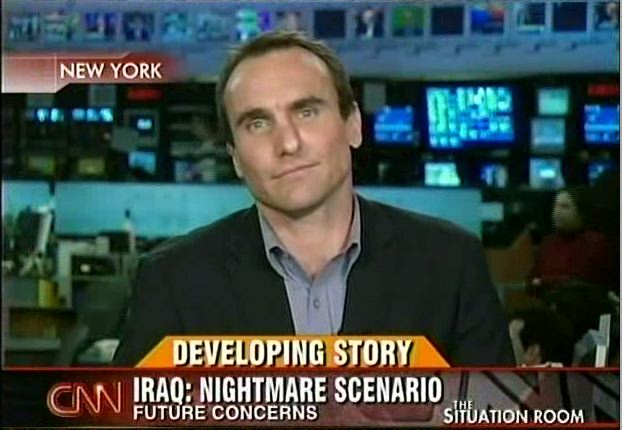TSR: "...there's very little alternative."

Click photo to play
Length: 4:33
WOLF BLITZER: So there are some precedents for this kind of situation where U.S. forces wind up helping forces that eventually turn against the United States. But how likely is this nightmare scenario in Iraq?
(BEGIN VIDEOTAPE)
BLITZER: And joining us now, our Baghdad-based correspondent, Michael Ware, he's in New York for a few days. Bottom line, Michael, this nightmare scenario that we've been talking about, how realistic is it that it could happen?
MICHAEL WARE, CNN CORRESPONDENT: Well, there's absolutely no doubt whatsoever, Wolf, that America is essentially, if not training and arming its enemies, it's certainly training and arming elements that don't share American interests or, indeed, are opposed to American interests -- be that Iranian-backed or Iranian sympathetic Shia government forces or even potentially future Sunni members of al Qaeda.
BLITZER: So, the United States is trying to strengthen the Iraqi army, and you're saying, elements of there could eventually turn against the United States. So what would be better right now, to simply continue training and arming them or dump them?
WARE: Well, that's a very difficult question to answer. I mean, as you know, the entire American exit strategy rises and falls upon the strength and capabilities of the Iraqi security forces. Someone or something has to be able to fill that vacuum when U.S. forces pull out. So, there's very little alternative, other than training these people and just dealing with what may result or what comes of it.
BLITZER: What do you see happening in the immediate period ahead? And in terms of defining the immediate period, over the next six months.
WARE: I think that we're going to see a situation that is very similar to what we've got now. I mean, that's one thing about this war, I presume like many: it's constantly mutating. It constantly redefines itself.
So while we see an influx or as the administration calls it, a surge of American troops into Baghdad, that's going to change the nature of the battle in the capital. Will it destroy the enemy? No. It may displace the enemy. It will force them to adapt and change their tactics.
But, is there going to be an overall improvement? Either in the life of the Iraqi people or in American interests represented in Iraq? The short answer is no.
BLITZER: So what should the U.S. be doing right now?
WARE: Well, that's a difficult question. I mean, I think America needs to be very clear about what the situation is on the ground. I mean, it's certainly -- the administration says it's putting a lot of its faith or maintaining its faith in this Maliki government. If that is, in fact, the case, then I think that faith is poorly placed.
I mean, by now surely the administration knows that this Iraqi government, for what it is, which essentially is an alliance of militias, is either not willing to or not able to deliver what America wants. So, at some point, even more difficult decisions are yet to be made by the American government and military commanders, and unpalatable alternatives are yet to be confronted.
BLITZER: I've heard some U.S. officials and analysts suggest that maybe Nouri al Maliki should be dumped and someone else emerge as the prime minister.
WARE: Yeah, well, there's certainly a lot of support for that amongst certain quarters of the American intelligence community and perhaps even among military commanders on the ground.
It's clear that so far Maliki hasn't delivered. No matter how many times the administration or American commanders have chided him, lectured him -- I mean, even President Bush, as soon as saying we're going to rely on this government, immediately in the State of the Union address turned around and said, yes, but you need to deploy forces and confront the radicals and remove these unnecessary restrictions. So as a partner, what do they offer?
So, yeah, a lot of people would like to see an alternative. The question is, who is there? How do you put them in there? America's committed this. We created this democracy, we created this government, goes the line, how can you then destroy it?
BLITZER: And as Nouri al Maliki himself told "The Wall Street Journal" last month, he hates the job, never wanted it, and can't wait to be done with it. Michael Ware, safe journeys back to Baghdad.
WARE: Thanks, Wolf.
(END VIDEOTAPE)
